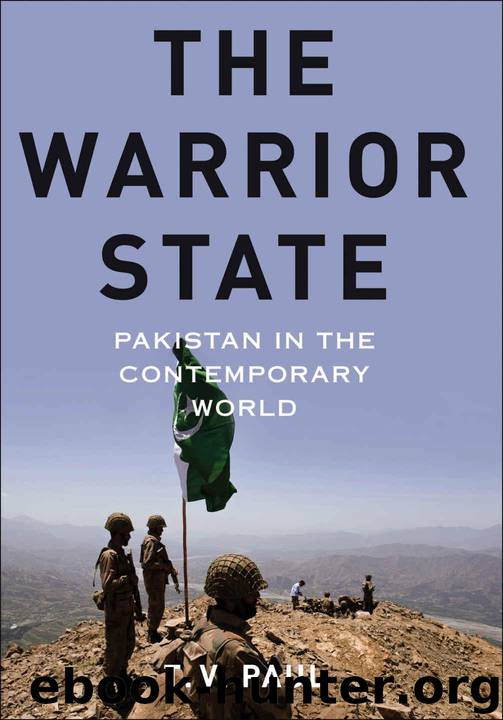The Warrior State: Pakistan in the Contemporary World by T.V. Paul

Author:T.V. Paul
Language: eng
Format: mobi
Publisher: Oxford University Press
Published: 2014-01-02T07:00:00+00:00
Sectarian Differences
Increasingly, political Islamism has meant not just the dominance of Islam as such but the dominance of Sunni Islam, and in particular the Deobandi tradition, over every other sect. Over 95% of Pakistan’s population adheres to Islam. However, it is largely a Sunni-dominated country, with nearly 75% of the total population following this branch. The Shia population comprises 20% while others, especially Christians, Parsis, Buddhists, and Hindus, constitute about 5% of the population. The Shias are followers of Ali ibn Abu Talib, the Prophet Muhammad’s cousin and son-in-law, whom they consider the legitimate successor to the Prophet. The Sunnis oppose this claim and do not regard him as “more righteous than his predecessors.”8 The Ahmadiyya minority, constituting some 2 million, venerate its founder Mirza Ghulam Ahmad as a messenger of God—a belief seen by many as rejecting Muhammad’s status as the last Prophet. Pakistan also has a small Ismaili community. Ismailis belong to the Shia branch and regard Agha Khan, their imam in continuous succession since 1818, as their spiritual leader. They are community-oriented and focus on social services and development.
The Sunnis themselves are divided between the Barelvis and the Deobandis, 15% and 60% of Pakistan’s population respectively. The Deobandis believe that the “Quran and Sunnah … provided a complete guide for life that needed no improvement by man.” The Taliban movement in Afghanistan and Pakistan follow the fundamentalist ideas originating from the Deobandi madrassas. They have made every effort to impose their views on the state and society and have been partially successful.9 Unlike the Deobandis, the Barelvis seem to hold to a more broader moderate and tolerant interpretation of Islamic teachings. They trace their origins from pre-partition Northern India, and have been known to draw from different religious practices of the subcontinent. This includes offering prayers to living or dead holymen or pirs, practices which the Deobandis view as paganist.10
The radicalization of Pakistani politics owes much to the divergent positions of Sunnis and Shias and the efforts by the Deobandi Sunnis to convert Pakistan into a “pure” Islamic state. These efforts have been resisted by the non-Deobandi Sunnis as well as the minority Shias. Both sides have engaged in violence to make their point. Pakistani domestic politics is interwoven with this conflict, and the efforts of politicians to use sectarianism for their objectives have only added to this conflictual relationship.11
Although some Shia Muslims like Zulfikar Ali Bhutto and Benazir Bhutto ruled Pakistan as prime ministers, their policies might have contributed to Sunni dominance over the years. Vali Nasr argues that the Shia-supported mix of secularism and populism of the former, coupled with corruption and authoritarianism, generated Sunni opposition, the military coup by the Sunni General Zia-ul-Haq, and the eventual hanging of the PPP leader. The military coup in 1977 basically ended the “Pakistani experiment with inclusive Muslim nationalism,” and over the years, Shias lost much of their political power.12 Benazir Bhutto attempted to appear to be Sunni,13 and her father had already helped to further the cause
Download
This site does not store any files on its server. We only index and link to content provided by other sites. Please contact the content providers to delete copyright contents if any and email us, we'll remove relevant links or contents immediately.
| Anthropology | Archaeology |
| Philosophy | Politics & Government |
| Social Sciences | Sociology |
| Women's Studies |
The Secret History by Donna Tartt(19066)
The Social Justice Warrior Handbook by Lisa De Pasquale(12190)
Thirteen Reasons Why by Jay Asher(8897)
This Is How You Lose Her by Junot Diaz(6881)
Weapons of Math Destruction by Cathy O'Neil(6270)
Zero to One by Peter Thiel(5792)
Beartown by Fredrik Backman(5744)
The Myth of the Strong Leader by Archie Brown(5505)
The Fire Next Time by James Baldwin(5434)
How Democracies Die by Steven Levitsky & Daniel Ziblatt(5217)
Promise Me, Dad by Joe Biden(5148)
Stone's Rules by Roger Stone(5084)
A Higher Loyalty: Truth, Lies, and Leadership by James Comey(4956)
100 Deadly Skills by Clint Emerson(4922)
Rise and Kill First by Ronen Bergman(4784)
Secrecy World by Jake Bernstein(4746)
The David Icke Guide to the Global Conspiracy (and how to end it) by David Icke(4712)
The Farm by Tom Rob Smith(4504)
The Doomsday Machine by Daniel Ellsberg(4487)
